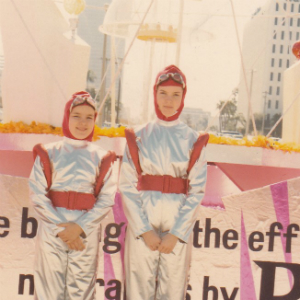“Anything you dream is fiction, and anything you accomplish is science, the whole history of mankind is nothing but science fiction.”—Ray Bradbury
My acquaintance with Ray Bradbury began at 12, when I and my sister wore Martian costumes for a float in the annual Gasprilla Parade in Tampa, Fla. The float theme, "The Future Belongs to the Efficient," capitalized on the 1980 NBC miniseries version of The Martian Chronicles. While I only remember being hot and throwing candy from the float, I retained more details about the miniseries. One of Bradbury's strengths was the ability to create human drama and unexpected twists. I later watched his short stories on The Ray Bradbury Theater and then became entranced by his novels—the magical beauty of a childhood that can at any moment be transformed into terror.
August 22, 1920 marks the 100th anniversary of the birth of a man who gave thousands of readers great stories and influenced a wide variety of artists—including writers like Alice Hoffman, Stephen King and Neil Gaiman, and directors David Lynch and Steven Spielberg. The wonderful tribute Shadow Show features short stories by many writers inspired by the Waukegan native.
In addition to movies, Bradbury’s overwhelming passion was reading and libraries; he spent his career promoting both. He missed the opportunity to go to college during the Great Depression, so the public library became his way to educate himself. After 10 years of going three times a week, he claimed to have “read every book in the library and written a thousand stories.” He credited Dorothea Brande’s Becoming A Writer for helping him develop his own voice and style, and instilling the discipline that helped harness his creativity. Bradbury collected his own philosophy on how a writer is formed in Zen in the Art of Writing.
At a library conference I attended years ago, Bradbury spoke about writing his classic Fahrenheit 451 at the UCLA Powell Library. He always emphasized that the novel reaffirmed that books and reading help form a democracy by teaching people how to think. His joy in the physical experience of opening a book and falling into a story endeared him to fans and reflected his pleasure in living each moment to the fullest.
Bradbury biographer and Columbia College professor Sam Weller described Bradbury's written language as musical and his literary vision as cinematic. The Bradbury Chronicles shares Weller's details from interviews with the author and research into Bradbury's life.
For the full Ray Bradbury experience, try The Stories of Ray Bradbury, a collection of a hundred stories out of the 600 he wrote over his career.



Add a comment to: Anything You Dream Is Fiction: Celebrating Ray Bradbury